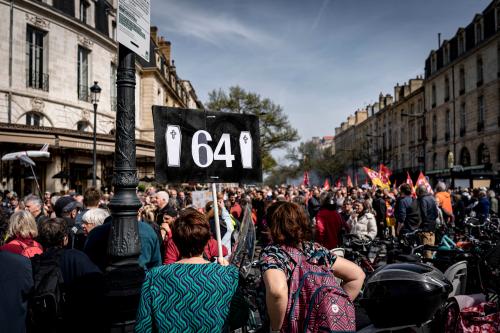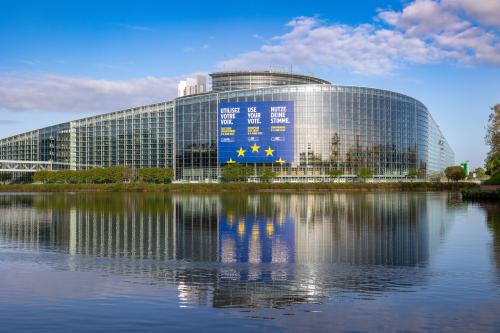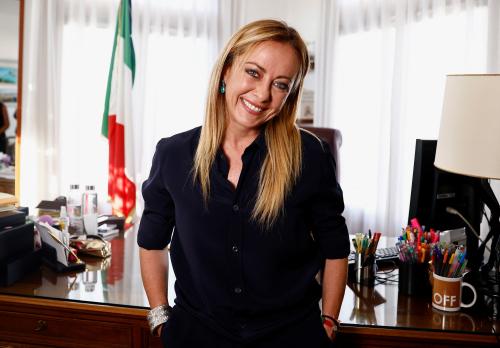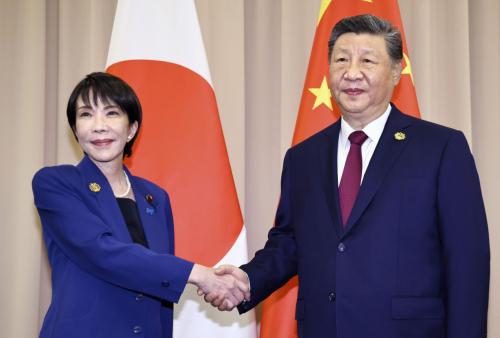The European Parliament’s (EP) elections took place over four days, from June 6 to June 9, 2024, across the European continent. Final projections indicate that there might be more continuity than expected in the European legislative body’s new parliamentary formation—but the results incited a political earthquake in France.
The far-right is now the premier political force in France.
The final results of the EP elections in France show a large victory for Jordan Bardella and Marine Le Pen, the far-right National Rally’s (RN) president and parliamentary group leader, respectively. They obtained about 31.4% of the vote share. In fact, with the vote share of splinter party Reconquête (about 5.5%), the far right represents nearly 40% of the vote in France—its highest percentage to date. By contrast, French President Emmanuel Macron’s Renaissance party obtained only 14.6% of the vote, despite having built his political platform around the theme of an existential battle between pro- and anti-European forces, represented by the far right. This strategy worked for Macron in the 2019 EP and the 2022 French presidential elections but failed this time. Indeed, the weekend’s results are consistent with projections by pollsters and indicate that the vote in favor of Le Pen and her protégé Bardella is no longer solely a protest vote. The far-right is now the premier political force in France. In the first European elections held in 1979, the vote share garnered by the RN—then the FN (Front National)—was 1.31%.
Macron and France respond
In response to this resounding defeat for his party and major victory for the far-right, Macron announced on June 9 that he was dissolving the French Parliament and called for two rounds of snap elections on June 30 and July 7. This has come as a huge surprise to many across the continent and will mark a sea change in French politics in the months and years to come.
Some leaders on the French left have already called for a “Popular Front” to mobilize against the far right for the upcoming snap elections, which will occur mere days before the country hosts the Olympic Games from July 26 to August 11. This is a call back to the historic Popular Front, a movement in 1930s France that led to significant progressive labor law reforms: the right to form unions, paid leave, and the 40-hour week—all key elements of the social progress model that France is now afraid of losing. And indeed, the center-left Socialist Party (PS), which had been going through an electoral trough with single-digit results in recent years, saw something of a comeback in this election, winning nearly 14% of the vote. Had PS allied with the Greens (Les Ecologistes-EELV) who got 5.5% of the vote, they would have been the second political force to come out on top of the elections, after the National Rally.
The possibility of an alliance encompassing all left-wing parties, including the far-left La France Insoumise (LFI)—comparable to the alliance created during the last parliamentary elections in 2022—was briefly discussed and then set aside, due to fundamental divergences on their respective visions for Europe. While the Socialists were looking to revive the legacy of their great statesman and committed European Jacques Delors, LFI adamantly stood against the idea of European power and the “Eurocrats in Brussels.” Their respective views on foreign policy—especially regarding Russia—have also proven irreconcilable.
Evidently, there is some political wrangling but thus far, the Greens, the Insoumis, the Communists, and some of the Socialists have agreed to form a common platform against RN. Raphaël Glucksmann’s camp—Place Publique—is still holding out over disagreements on foreign policy, notably on the French far left’s relationship with Russia. His party came in third, right after Macron’s, but his semi-victory was overshadowed by the dissolution of the National Assembly. Time will tell whether negotiations can overcome these disagreements and result in an all-encompassing left popular front against the RN.
An ascendant far right?
In the meantime, the RN has portrayed itself as the only political force capable of defending the singularity of the French social model against what the far-right too calls “elitist institutions in Brussels.” RN has completely appropriated much of the vocabulary traditionally reserved to the left (a new move by the far right in France, but one that the MAGA wing of the U.S. Republican Party has frequently used). This is upending and fundamentally restructuring French politics.
The high risk that the RN will win the snap elections is cause for great concern. The splinter party Reconquête has already indicated its willingness to talk to Le Pen and Bardella. On June 11, Eric Ciotti, president of the mainstream rightwing party Les Républicains, unilaterally announced he would offer an alliance to the RN, henceforth rupturing the “cordon sanitaire” (firewall) strategy that has prevented the right and the far right from becoming allies until now. Ciotti’s proposition caused an uproar with most of his Les Républicains colleagues, who denounced his actions and questioned his legitimacy as the president of the party.
If this far-right party coalition comes to fruition and wins the snap elections, France will have a far-right prime minister for the first time since the end of World War II. It would be a stark contrast to Macron’s energetically pro-European and trans-Atlantic posture—and the moving celebrations hosted by France for the 80th anniversary of D-Day in Normandy, for dozens of heads of state, including U.S. President Joe Biden, who gave a speech on democracy at La Pointe du Hoc.
Macron’s decision is an extremely risky bet, which could easily backfire. He is essentially offering to accept a more representative National Assembly (the French legislature), while at the same time betting on the RN’s incompetence and incapacity to govern the country—hoping that this would decrease the party’s prospects for the 2027 presidential election. Also, Macron has effectively disconnected France’s presidential election and parliamentary elections again. The presidential mandate used to be for seven years, while the parliamentary mandate lasted five. Following a constitutional reform in 2000, however, the two elections were linked.
Finally, while shaping French foreign policy remains the president’s prerogative, the election of a far-right prime minister might have a significant indirect impact on France’s external relations. A National Assembly dominated by the far right could demand opportunities to influence the foreign policy decision-making process. Le Pen and Bardella have recently repeated that they would not withdraw from NATO while the war in Ukraine continues—but they might take a different view once in power and depending on developments on the ground. Both leaders have been very close to Russia and its president, Vladimir Putin; they received loans from Russian banks for years. Le Pen might follow the example of Italian Prime Minister Giorgia Meloni, who heads the far-right party Fratelli d’Italia (Brothers of Italy), of working with NATO while undermining the European Union. But she would almost certainly want to join other European leaders in delaying Ukraine’s accession negotiations into the EU.
On the other hand, foreign policy may feature only marginally in France’s political debate over the next three weeks. The RN will focus its messaging on migration, the economy, and labor laws—all top priority issues for the French electorate.
The Brookings Institution is committed to quality, independence, and impact.
We are supported by a diverse array of funders. In line with our values and policies, each Brookings publication represents the sole views of its author(s).








Commentary
The European Parliament elections have upended French politics
June 12, 2024